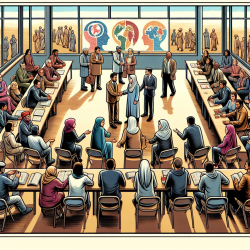Implementing Humanitarian Research Frameworks in Special Education: A Focus on Refugees
As a Special Education Director, one of the key responsibilities is ensuring that all students, including those from refugee backgrounds, receive the support they need to thrive in an educational setting. Drawing from the research article "People First, Data Second: A Humanitarian Research Framework for Fieldwork with Refugees by War Zones," this blog explores how special education practitioners can enhance their skills and services by implementing humanitarian research frameworks.
The research emphasizes the principle of "People First, Data Second," which prioritizes the needs and dignity of individuals over data collection. This approach is particularly relevant in special education, where understanding and addressing the unique challenges faced by refugee students is crucial.
Understanding the Humanitarian Research Framework
The humanitarian research framework outlined by Karen E. Fisher focuses on guiding researchers working in conflict zones with displaced persons. It emphasizes context-based, participatory field methods and the importance of engaging in country and regionally based, longitudinal partnerships. This approach aligns with the principles of special education, where individualized education plans and tailored support are fundamental.
For special education practitioners, adopting a humanitarian research framework means prioritizing the voices and needs of refugee students and their families. This involves actively listening to their experiences, understanding their cultural backgrounds, and collaborating with them to develop effective educational strategies.
Implementing the Framework in Special Education
To implement the humanitarian research framework in special education, practitioners can consider the following strategies:
- Engage in Participatory Research: Involve refugee students and their families in the research process. This can be done through interviews, focus groups, and collaborative workshops. By including their perspectives, practitioners can gain valuable insights into their needs and aspirations.
- Build Longitudinal Partnerships: Establish long-term relationships with refugee communities, local organizations, and other stakeholders. This allows for ongoing support and collaboration, ensuring that educational interventions are sustainable and culturally appropriate.
- Focus on Contextual Understanding: Recognize the unique challenges faced by refugee students, such as language barriers, trauma, and cultural differences. Tailor educational programs to address these challenges and provide targeted support.
- Ensure Ethical Research Practices: Follow ethical guidelines and prioritize the well-being of refugee students. This includes obtaining informed consent, maintaining confidentiality, and respecting cultural norms.
Encouraging Further Research
While the humanitarian research framework provides a valuable foundation, there is still much to learn about supporting refugee students in special education. Practitioners are encouraged to engage in further research to explore innovative strategies and interventions. This could involve collaborating with academic institutions, attending conferences, and participating in professional development opportunities.
By continually expanding their knowledge and skills, special education practitioners can ensure that refugee students receive the high-quality education and support they deserve.
To read the original research paper, please follow this link: People First, Data Second: A Humanitarian Research Framework for Fieldwork with Refugees by War Zones.










